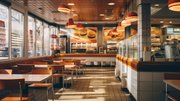News
POS in the new era
January 24, 2006
Want to increase customer growth quickly? Think about investing in a point-of-sale (POS) system. A new system could turn a profit before next year's taxes.
When the new era of POS systems was introduced to the quick-service restaurant (QSR) marketplace 10 years ago, they were designed for cash management. Now managers take advantage of the technology's marketing, labor management, inventory and security benefits.
With today's POS, managers enjoy unlimited order processing, comprehensive reports, customizable screens and multi-station capabilities. The screens are softer than before, but perhaps the biggest benefit is speed. Ivan Johnson, an assistant manager for a Kentucky Wendy's, said their POS system really helps during the lunch hours.
"Our POS system keeps the flow going for our employees and knocks down service time," Johnson said. "Our employees really like it because it helps us keep orders right."
According to Jeff Wuorio, an author and leading business reporter for Microsoft.com, a POS system in the QSR segment should be a natural fit.
|
Services vs. cost
Anybody with a credit card can purchase a POS system. Some low-cost, low-value systems are even sold on eBay. But the old adage "you get what you pay for" is certainly true with POS systems. Gina Pearce of ParTech, a leading restaurant POS supplier, said QSRs should consider hardware design, services and return on investment when purchasing a POS system.
"Because the QSR environment can be harsh, it is important to choose a hardware that is built to last," she said.
ViGo, ParTech's newest hardware, is built for the harsh QSR environment, Pearce said, with virtually a spill-proof design. Other popular POS system brands include Aloha, Radiant, Siva and POS Works. In fact, there are more than 50 POS suppliers in the QSR market alone. But no matter who the POS provider is, Pearce said QSRs should seek service over price.
"Uptime is key to the QSR operator. A terminal down during lunch or dinner rush hours translates to longer wait times, customer dissatisfaction and ultimately loss of business," she said. "The second most important factor in ensuring maximum uptime — after reliable equipment — is service and support. Choosing a technology partner that provides direct service, is responsive and employs experts in QSR, should be a factor that every owner/operator considers before purchasing a new POS system."
Pearce said the most important overall benefit of a POS is increased profitability. "Owner/operators should expect to see a return on their technology investment."
Another step to consider is the rollout. The main concern becomes do you start one system or hundreds. No matter how many POS systems are selected for the store or chain, the success will depend on a well-designed integration into your restaurant. But operators shouldn't feel alone. Companies like ParTech have the resources and years of industry expertise to meet expectations.
Just remember to think service, installation and quality when selecting your POS provider.
 ChatGPT
ChatGPT Grok
Grok Perplexity
Perplexity Claude
Claude











